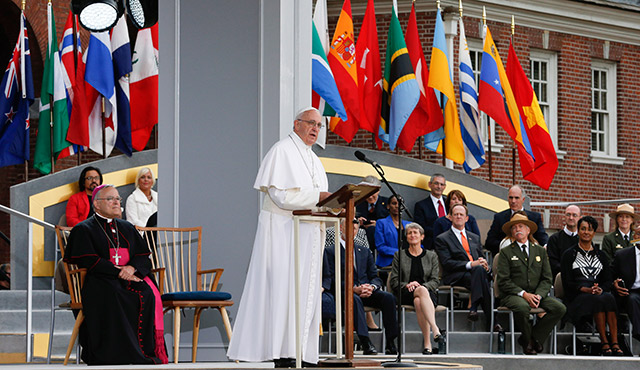This is the second part of a three-part feature story written by Monsignor Holquin that will appear this month in Orange County Catholic in which he discusses three of the most significant documents produced by the Second Vatican Council on the occasion of the 50th anniversary of the council’s closing.
The second of the groundbreaking documents coming forth from the Fourth and final session of the Council in the fall of 1965 would focus its attention on the Church’s relationship to the state and the critical question of religious liberty.
Prior to the council, the received and ordinary teaching of the Church relative to its relationship to the state was succinctly summarized in the maxim, “Error has no rights.” In other words, within the “ideal” state, the truth of the Catholic faith would be the established and protected religion of the state. The expectation for non-Catholics was either conversion or a “toleration” of their presence as well as a passive toleration of their ways of worship on the part of the state.
With the formation of our United States in the 18th century and the notion of separation of Church from state articulated in the First Amendment of the Constitution, the issue of religious liberty continued to be a neuralgic issue for the Catholic Church vis á vis the United States.
Thanks to the theological insights relative to this question by the American Jesuit John Courtney Murray (1904-1967), who was a theological expert or peritus, at the council, it has been said that the unique contribution of the American bishops to the Second Vatican Council can be seen reflected in the council document Dignitatis Humanae (Declaration on Religious Liberty).
Hence, after heated debate among the council fathers, the council would eventually arrive at the groundbreaking statement articulating with clarity a “development” in the doctrinal position of the Church in regard to the question of religious liberty:
This Vatican Council declares that the human person has a right to religious freedom. This freedom means that all men are to be immune from coercion on the part of individuals or of social groups and of any human power, in such wise that no one is to be forced to act in a manner contrary to his own beliefs, whether privately or publicly, whether alone or in association with others, within due limits. The council further declares that the right to religious freedom has its foundation in the very dignity of the human person as this dignity is known through the revealed word of God and by reason itself. This right of the human person to religious freedom is to be recognized in the constitutional law whereby society is governed and thus it is to become a civil right. (DH #2)

